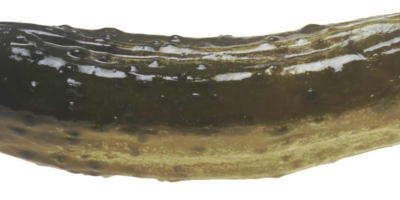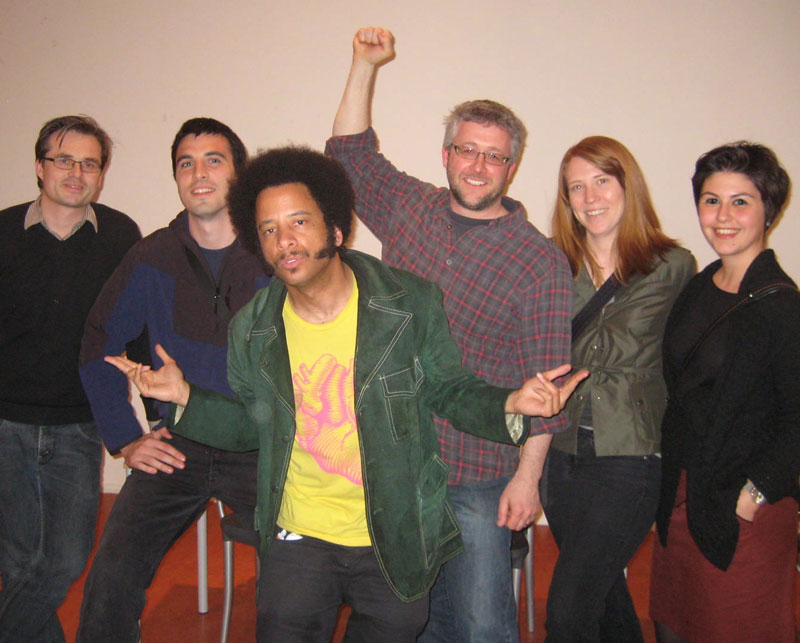Our man in Amsterdam helps bring The Coup to Amsterdam
By Michael Marchman
When I got an email from a friend and fellow activist a few weeks ago asking if I was interested in helping to arrange a show in Amsterdam for the Oakland-based revolutionary hip-hop band, The Coup, I nearly choked on my bitterballen.
I’ve been listening to The Coup for well over a decade. They’ve basically provided the soundtrack for my own political activism over the past ten years. Not only am I a big fan of the group, I’ve followed and admired Boots Riley’s, the front man’s, work as an organizer and agitator for a long time.
Riley is a virulent critic of capitalism, corporate power, and racism. Both his music and his activism reflect a long-standing commitment to radical social and economic change. In addition to leading The Coup, he is also in a band with Tom Morello (of Audioslave and Rage Against the Machine) called the Street Sweeper Social Club, which, as Morello puts it, produces “revolutionary party jams.” He has collaborated with rappers E-40, Tupac Shakur and Dead Prez among others. On the political front, he’s been involved with the Progressive Labor Party, the International Committee Against Racism, CopWatch, the Womens’ Economic Agenda Project, and the International Campaign to Free Geronmio Pratt. He’s taught courses on persuasive lyric writing at the School of Social Justice and Community Development in Oakland, has been a guest on the independent news program Democracy Now!, and joined Morello, Billy Bragg, Steve Earle, Naomi Klein and others in the “Tell Us The Truth Tour” to challenge corporate globalization and media consolidation. You might say the man’s got some cred.
The Coup, as it turned out, was playing a festival in another part of the Netherlands and was looking for a place to perform that night in Amsterdam. In addition to wanting to do a show, Boots was willing to give a public talk on his involvement in the Occupy movement and the Oakland General Strike last November.
As someone interested in progressive political and economic change and as a participant in Occupy Amsterdam, I knew that somehow I had to help make this happen, so I convinced friends to help me. Unfortunately, I didn’t know the first fucking thing about organizing a concert (especially on short notice in the Netherlands) but I was able to talk a local student-run club into hosting the show and arranged for a progressive activist institute where I volunteer to host a public talk by Boots beforehand. A few activist friends helped work out the logistics, print and hang posters around town, and spread the word through social media.
Oakland General Strike
Boots’ talk before the show on Occupy and the Oakland General Strike was well received. He discussed how Occupy had transformed people’s attitudes about protest and the potential for revolutionary change in the US. “The Occupy movement,” he said, “shows that many of us have underestimated the working class in the US by looking at the [terrible] political and economic situation and deciding that it is the way it is because the working class in the US is not politically ready for change.”
“That’s been the story, but what I’ve always thought is that people don’t think they can change it and that’s the key…People know that the system is unjust but feel like there is no movement that they can join that has any possibility of doing anything about it. I think Occupy Wall Street changed that for a lot of people. There was all of the sudden this feeling that ‘wow, this is a movement that can do something.’”
Boots described the brutal attack of Oakland protesters by police in late October. This was the same protest during which Iraq War veteran and Occupy Oakland supporter Scott Olsen was nearly killed when he was hit in the head with a tear gas canister shot at him at close range by a police officer.
“The police kept shooting tear gas and rubber bullets at us. And when that happens you run away… But we just kept marching around the block and coming back at them, and I think that scared them as much as anything because they could clear us out for a few minutes but we’d just come back…We just kept coming back all night. They spent 3 million dollars to keep us out of that square that day. We knew that they couldn‘t keep that up. We knew we would win at some point.”
The following day, Occupy protesters retook Oscar Grant Plaza and three thousand people showed up for that night’s General Assembly. “We used the moment,” Boots said, “the fact that the world was watching because of what happened to Scott Olsen and because of how brutal the police were to us all, we used that moment to call for a General Strike. I think that many of us that called for it and many of us that voted for it didn’t think that it would necessarily happen, you know, [but] we knew that the call was important.”
By this point, the media was unable to ignore the Occupy movement. Its slogan, “We are the 99%,” was being openly discussed in mainstream news sources. But, as the Coup frontman recalled, calling for a General Strike would push the message further. It would remind people that “we can stop the wheels of industry.”
And Oakland did. Estimates are that some 50,000 people participated in the strike and blockade of the country’s fourth largest port, resulting in $8 million in losses. The success of the strike and the port shutdown had ripple effects on people’s political and economic consciousness.
“Among people that I grew up with in Oakland” Boots said, “a lot of people were like ‘we’re done with that marching shit, that marching shit doesn’t get shit done.’ …Those criticisms come up with any movement, but it was different after we shut down the port for the first time. People saw it, you know, they saw the economic relationship between labor and capital. And that’s one of the biggest things they saw, that ok, even if you only want to make reforms, that’s something we need to do… mess with their pocketbooks.”
Overcoming difference
Boots ended by discussing the necessity of developing strong relationships of solidarity and overcoming internal divisions if we are to build an effective democratic and progressive movement. “Sectarianism,” he said, “plays out in various ways, but I think the idea of the whole Occupy Wall Street Movement is the anti-thesis of sectarianism. It’s one thing that we needed […] We need to cut through that bullshit and just say, ‘Ok, here is the campaign. We all need to work together on this.’ Around the world, if we are going to fight capitalism, that is what we are going to have to do. We are going to have to figure out how to overcome our differences. And we are not going to figure that out before we start working together, you know.”
He’s right, of course. We are looking at an exceptional opportunity right now. If we are smart and determined and relentless and willing to step up the struggle in these kinds of ways, we can build a successful progressive, international movement against corporate greed, corruption, inequality, and capitalism. For all its virtues, this system has failed the majority of people on this planet and will continue to do so. But it is not immutable. We can make something much more just and much more human if we want.
One thing that Boots did not mention at the talk is that there is a call across the entire Occupy network for a mass General Strike on May 1 – International Worker’s Day! Occupy Oakland has announced, however, that they will not be trying to shut down the port this time. That’s because this time the International Longshore and Warehouse Union (ILWU) are planning to join in the General Strike themselves. On May Day, let’s all join in to “mess with their pocketbooks” and “stop the wheels of industry.”
As Boots puts it in one of The Coup’s songs, “Shut the jobby-job down at noon and don’t disperse!” Unfortunately, this is the only thing corporate oligarchs seem to listen to.
Love and solidarity from Amsterdam.
Watch the whole talk plus clips from the concert at www.iire.org.




Leave a Reply